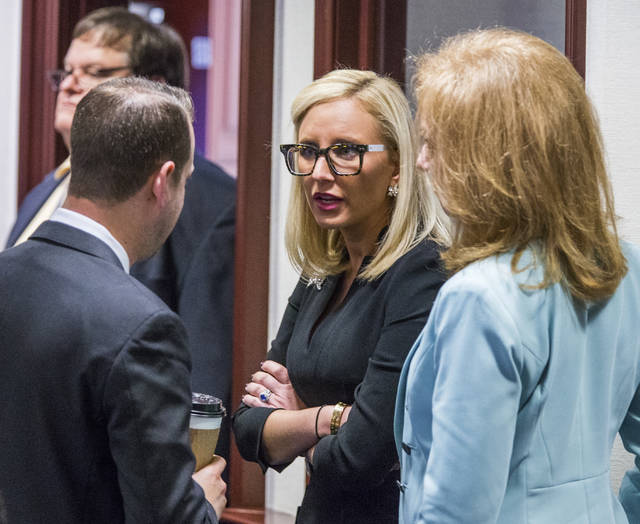WASHINGTON — As the #MeToo movement against sexual misconduct began snaring politicians, state legislatures across the country vowed to re-examine their policies to prevent harassment and beef up investigations into complaints of sexual wrongdoing.
About half of all state legislative chambers have followed through with at least some sort of change to their sexual harassment policies, most often by boosting their own training, according to a 50-state analysis by The Associated Press. But the others have done nothing this year, even as sexual misconduct allegations against lawmakers have been mounting.
Ups and downs
The mixed response highlights both the political pressure to act and the institutional resistance to do so that exists in many state legislatures, where women now serve in record numbers yet remain outnumbered 3-to-1 by men.
“In the wake of Harvey Weinstein and the #MeToo movement that swept across different industries, we had to act,” said Democratic Assemblywoman Nily Rozic of New York, which mandated more robust sexual harassment policies for government agencies and private employers.
But “I think we have a long ways to go in addressing sexual harassment in legislatures across the country,” she said.
Malefactors
Since the start of 2017, at least 30 state lawmakers have resigned or been kicked out of office following allegations of sexual misconduct, according to an AP tally. The most recent was Maine Rep. Dillon Bates, a Democrat who quit this past week while denying claims of inappropriate relationships with students.
An additional 26 lawmakers have faced repercussions such as the loss of party or committee leadership positions since last year, including Maryland Del. Curt Anderson, a Democrat who was removed from his leadership posts Friday after an investigation into sexual misconduct. Numerous others have had allegations brought against them.
Most of those cases came to light since October, when media reports about sexual misconduct allegations against Weinstein, the Hollywood mogul now facing sexual assault charges in New York, led to a national movement of people going public with claims that they also had been sexually harassed or abused, sometimes years ago.
Trying for change
Rhode Island Rep. Teresa Tanzi was among the first to come forward, asserting that a high-ranking legislator whom she did not identify had told her that sexual favors would help her bills go further. The disclosure prompted the House to offer sexual harassment training and to place Tanzi, a Democrat, in charge of a task force to recommend changes to state law.
But the experience ultimately left Tanzi frustrated. With this year’s session nearing its end, the panel’s work was put into a package of bills that would have barred confidentiality agreements in civil rights violations, extended employee protections to interns and volunteers, and required employers to conduct sexual harassment training. None of the bills passed.
“It really to me felt as though it were just a dog-and-pony show,” Tanzi said.
Little progress
When the AP surveyed state legislatures in early January, about three-quarters of the House and Senate chambers nationwide indicated they were considering or had recently made changes to their sexual harassment policies. As of August, the AP’s follow-up survey found that about half of the 99 state legislative chambers actually had made changes. More than two dozen that previously indicated they were reviewing policies have yet to make any substantive changes, though some are still considering it.
The AP’s analysis also found:
— The most common response among lawmakers has been to boost their own training about sexual harassment. About half the legislative chambers have done so, typically by making it mandatory or providing it more frequently. But legislative chambers in one-fifth of the states still do not require lawmakers to participate in sexual harassment training.
— Legislative chambers in about a half-dozen states have taken action to increase the public disclosure of sexual harassment complaints against lawmakers and to ban the use of public money in sexual harassment settlements.
— Legislatures in about one-fifth of the states added provisions since the #MeToo movement allowing for the external investigation of complaints, which some experts say is an important way of avoiding conflicts of interest and encouraging the targets of harassment to come forward. Even so, fewer than half the legislative chambers nationwide now allow for the external review of complaints.
— Only a few legislatures passed measures that apply beyond state government. Lawmakers sought to strengthen sexual harassment protections for private-sector employees in Arizona, California, Maryland, New York, Tennessee, Vermont and Washington.








